MercoPress. South Atlantic News Agency
Uruguay
-
Friday, August 21st 2009 - 11:22 UTC
Uruguay forecasted to fall 0.8% this year and expand 1.5% in 2010

Uruguay is forecasted to contract 0.8% in 2009 and rebound 1.5% next year according to chief economist for South America from the Spanish banking group BBVA, Joaquín Vial
-
Wednesday, August 19th 2009 - 12:46 UTC
Clear and reliable rules of the game, Uruguay’s main asset

Uruguay remains as a most attractive country for Argentine investors because of its business opportunities, logical taxing system and absence of export levies plus its geographical closeness, according to Luis Bonetto Argentine investment advisor and expert in agriculture.
-
Saturday, August 15th 2009 - 11:07 UTC
Mexico/Uruguay sign strategic association accord and advance trade
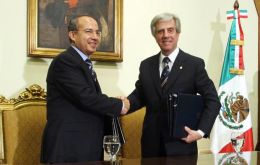
Mexico president Felipe Calderón and Uruguay’s Tabare Vazquez signed on Friday in Montevideo a Strategic Association accord to strengthen political dialogue and bilateral trade relations in the framework of the 2004 free trade agreement.
-
Saturday, August 8th 2009 - 14:10 UTC
Uruguay’s flag carrier plans to fly Santiago de Chile/Punta Arenas

A third operator could be joining Lan and Sky Airline in cargo and passenger traffic between Santiago de Chile and Punta Arenas, according to an official request presented before Chile’s Civil Aeronautics Agency last July 24, reports La Prensa Austral.
-
Friday, August 7th 2009 - 12:50 UTC
Mercosur works if Brazil makes it work, said Uruguayan presidential hopeful
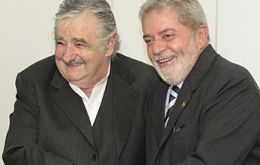
The Uruguayan ruling coalition presidential candidate Jose Mujica said Brazilian president Lula da Silva promised to help speed power inter-connection between the two neighbouring countries, in the framework of Mercosur, in spite of Argentina’s non supportive attitude. He also underlined Mercosur depends on Brazil’s willingness.
-
Thursday, August 6th 2009 - 16:50 UTC
Opinion poll confirms November run off for Uruguay’s presidential election

Uruguay’s ruling coalition has a ten point lead for October’s presidential election with 44% of the vote followed by the main opposition National party with 34%. However if the tendency is confirmed, a run off is inevitable in November according to Equipo Mori pollsters.
-
Tuesday, August 4th 2009 - 09:45 UTC
Opinion polls anticipate Uruguayan presidential election with run-off

The coming Uruguayan presidential election scheduled for October will be decided in a run off at the end of November according to the tendencies of the latest public opinion poll released Monday in Montevideo.
-
Friday, July 31st 2009 - 12:30 UTC
Japanese rating agency upgrades Uruguay’s debt to stable BB
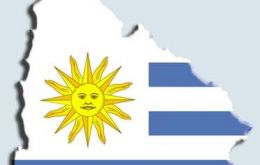
The Japanese Rating and Investment agency has upgraded Uruguay’s debt rating from BB- to BB with a stable outlook according to the latest release this week. This is two slots below investment grade and recognized among other factors the light public debt service burden until 2011.
-
Thursday, July 30th 2009 - 03:32 UTC
NZ dairy farming group in Uruguay raised 30 million USD locally
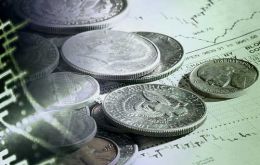
NZ Farming Systems Uruguay Ltd has raised 30 million US dollars by selling a first tranche of bonds in Uruguay. The non-convertible bonds have an expected maturity of about 15 years, and pay a fixed interest rate of 5% until September 30, 2010.
-
Tuesday, July 28th 2009 - 15:07 UTC
Uruguay downgrades 2009 growth estimate to 0.7%
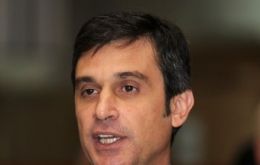
Uruguay’s Finance minister Alvaro García for the third time in eight months downgraded the country’s growth estimate for 2009. At a press conference following the regular Monday cabinet meeting, Gracía said that the economy will expand 0.7% this year, down from the April estimate of 2% and 3% from last December.
